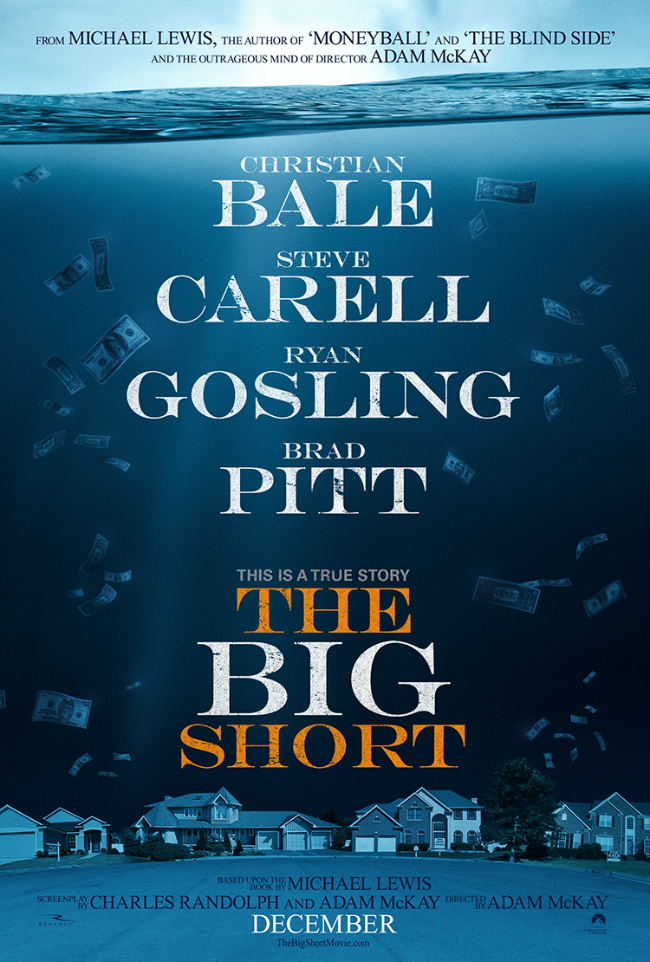
I'm sure we all remember it like it was yesterday, the year when the world economy came crashing down. But 8 years after the 2008 financial crisis, can you even explain exactly what happened? In his new film "The Big Short", Adam McKay attempts to break it down for us laymen, using a star-studded cast to illuminate us with this serio-comic look at that tumultuous year.
Based on the book by the same name, "The Big Short" chronicles the housing market collapse from the perspective of three separate groups of men who predicted the crisis years in advance. This first is Michael Burry (Christian Bale), a hedge fund manager who noticed something fishy in the housing market, which was propped up on subprime loans providing low returns. Realizing an impending collapse, he creates a credit default swap market, where he bets big against the housing market in order to reap huge profits when it inevitably fails. His plan reaches the ears of Jared Vennett (Ryan Gosling), a shrewd trader who quickly gets in on the action. He ropes in another hedge fund manager named Mark Baum (Steve Carell), who also puts his money on the line after some initial skepticism. And the final group are a pair of up-and-comers (played by John Magaro and Jamie Shipley) who, along with the advice of retired banker Ben Rickert (Brad Pitt), decide to make some deals with the banks. And of course, the rest is history. Burry's prophecy came true and all these men profited, but at great cost to their own sense of justice, as well as that of the American people.
As he recounts the events as they played out, McKay takes us behind the scenes for a film that epitomizes "America" in its style and content. Throughout the film we're constantly reminded that the housing market is stable and it has never, and will never crash. But as this surprisingly accessible screenplay weaves through the web of fraud and lies, this proves to be just another instance of debilitating American arrogance. Indeed, if this were fiction, these events would be portrayed as political thriller. But as McKay and Randolph rightfully show, these matters were treated with little urgency.
Instead, McKay takes an unorthodox approach that itself reflects the sort of risk-taking individuality that represents the American ideal. Tonally, the film yo-yo's between near-parody and haunting gravity, defying what we expect from a dramedy based on real life. It's a mix that doesn't always work, but the peculiarity of it all is constantly fascinating. For example, the pop culture snippets that editor Hank Corwin splices in, which sometimes remind you of when you accidentally record over pre-existing viedo on a VHS. And yet somehow, through the sheer commitment of McKay's vision, it all makes sense.
Perhaps the only conventional aspect of the film is its performances, handled by a terrific ensemble. Steve Carell gives a brilliantly nuanced "mad as hell" turn as the incredulous Mark Baum, Ryan Gosling is at his confident best, while Christian Bale once again proves that despite his movie star looks, he's truly a character actor. But the real human face of the film comes from the unnamed side characters, those who are doomed to suffer as a result of the greed. Sure, McKay includes a lot of frivolous cameos and playful sarcasm, but when it comes to the real heart of the matter, he's poignantly serious.
I've now seen "The Big Short" twice and I'm still trying to fully wrap my head around it. But perhaps this is fitting for a film about one of the most perplexing phenomenons of our time. One thing that comes across loud and clear though, is that "we're all f***ed".
And another thing that's obvious is that this film is set to be a major Oscar player. Come Thursday morning, I expect to hear "The Big Short" called up for noms in Best Picture, Best Director, Best Supporting Actor, Best Adapted Screenplay and Best Editing. Not bad for a film directed by the guy whose previous credits were "Anchorman 2" and "The Other Guys".
| Tweet |






No comments:
Post a Comment